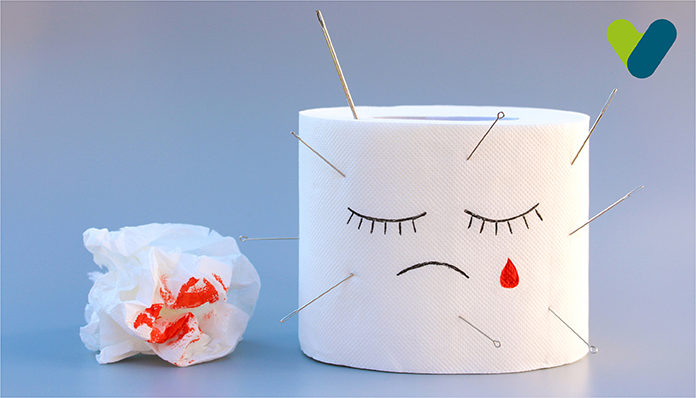An anal fistula is a tiny tunnel that runs between your anus end and near the anal skin (where poop excretes from the body). An anal fistula usually grows due to infection and when pus is getting accumulated near the anal area. Inside the anus many small glands make mucus. Under certain conditions, these glands become clogged and infected which can lead to an abscess. Nearly half of these abscesses may turn into a fistula.
What Causes an Anal Fistula?
Some prime causes are responsible for clogged anal glands and anal abscesses. Sometimes, a less common condition may develop an anal fistula. Popular causes of an anal fistula are- Crohn’s disease (an inflammatory disease of the intestine)
- Radiation (treatment for cancer)
- Trauma
- Sexually transmitted diseases
- Tuberculosis
- Anal infection
- Diverticulitis (a disease that produces small pouches in the large intestine and becomes inflamed)
- Cancer
What are the Symptoms of an Anal Fistula?
Let’s take a look at some of the signs and symptoms of anal fistula.- Recurrent anal abscesses
- Pain and inflammation around the anus
- Bloody stool
- Foul-smelling drainage (pus) from an opening around the anus
- Irritation around the anus from drainage
- Painful bowel movements
- Bleeding
- Fever, chills
- A fatigue feeling
How is an Anal Fistula Diagnosed?
By examining the area around the anus physically, your doctor may diagnose whether you have a fistula or not. The doctor checks the opening area (the fistula tract) on the skin. In some cases, there can be drainage from the external opening.Sometimes, a fistula may not be visible on your skin. For diagnosis, your doctor will conduct several other tests.
- An anoscopy is a procedure where a special instrument is inserted into your anus and rectum to identify fistula
- Your doctor may perform an ultrasound or MRI of the anal area so that he can get a proper view of the fistula tract.
- Sometimes a surgeon needs to examine you in the operating room (called exam under anesthesia) for the exact diagnosis of fistule.
Treatments of Fistula
Surgery is the only option that will give you a permanent cure for an anal fistula. The surgery is performed by a colon and rectal surgeon. The prime objective of the surgery is to remove the fistula without hampering the anal sphincter muscles.Anal Fistulotomy
Fistulas in which there is no or a small amount of sphincter muscle involved can be removed by an anal fistulotomy. A fistulotomy is a small surgical procedure that cuts and drains the fistula. This will help the anal area to heal quickly. This surgery also closes the infected tract. This type of surgery is a daycare process, thus, you don’t need to stay in the hospital. If the fistula is superficial, then fistulotomy can be performed at the doctor’s office with local anesthesia. The procedure may take an hour. For deeper fistulas, your operation is performed under general anesthesia.During the fistulotomy, the surgeon cuts at the site of the fistula. Then, he opens the fistula surgically and removes pus or other fluids. In some cases, stitches are required during a fistulotomy. Sometimes, the wounds are left open or either may be covered with gauze.
Some complications of anal fistulotomy
- You may suffer from some anesthesia complications, like headache and dizziness
- Post-operational pain
- Fever
- Temporary loss of bowel control
- Bleeding
- Recurrence of fistula with pus
- Always keep the area clean after a surgery
- Change your dressings at regular intervals. Some fistulas are covered with gauze and this gauze should be changed to stay away from infection
- Sometimes, sitz baths (in which a person sits hip-deep in the water to bathe) are suggested during the healing process.
- Doctors often give medications including pain medications, stool softeners, antibiotics, or fiber supplements.
- Go for a few follow-up appointments with the doctor to check how your wound is healing
Anal Fistula Surgery
- An advancement flap procedure (the fistula is covered with a flap, or piece of tissue, taken from the rectum, like a trap door) is also performed to cure fistula
- A lift procedure (the skin above the fistula is opened up, the sphincter muscles are spread, and the fistula is sealed off) is also recommended in case of certain fistulas
- There is a new treatment that is recommended only for Crohn’s disease fistulas. Under this treatment, the doctor injects stem cells into the fistula.
What to Tell a Doctor Before Opting for the Surgery
Don’t hide any information before performing the surgery. Tell the following things to your doctor so that he can get a better idea of your condition.- How long you are suffering from pain, burning sensation, and swelling
- How bad your discomfort is
- What type of bleeding have you noticed?
- Symptoms that you are commonly experiencing


